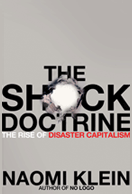The Shock Doctrine

Disaster Capitalism in Action: goldman sachs
Bailout Helps Fuel a New Era of Wall Street Wealth
Graham Bowley, New York Times, October 17, 2009
"Titans like Goldman Sachs and JPMorgan Chase are making fortunes in hot areas like trading stocks and bonds, rather than in the ho-hum business of lending people money. They also are profiting by taking risks that weaker rivals are unable or unwilling to shoulder — a benefit of less competition after the failure of some investment firms last year....
"A year after the crisis struck, many of the industry’s behemoths — those institutions deemed too big to fail — are, in fact, getting bigger, not smaller. For many of them, it is business as usual. Over the last decade the financial sector was the fastest-growing part of the economy, with two-thirds of growth in gross domestic product attributable to incomes of workers in finance."
"Now, the industry has new tools at its disposal, courtesy of the government.
With interest rates so low, banks can borrow money cheaply and put those funds to work in lucrative ways, whether using the money to make loans to companies at higher rates, or to speculate in the markets. Fixed-income trading — an area that includes bonds and currencies — has been particularly profitable."
Bonus Pools On Wall Street Continue To Fatten
Jessica Papini and Joe Bel Bruno , Wall Street Journal, October 15, 2009
"Goldman Sachs Group Inc. (GS) and JP Morgan Chase & Co.'s (JPM) investment banking and asset management units are setting aside money to dole out huge bonuses this year and are likely to surpass even the boom paydays of 2007....
"While bonuses were down across the industry last year, this year bonuses are starting to soar, with some companies set for a record compensation year. U.S. banks and securities firms are on track to pay employees roughly $140 billion this year, a record high, according to analysis from The Wall Street Journal."
Wall Street Stealth Lobby Defends $35 Billion Derivatives Haul
Christine Harper, Matthew Leising and Shannon Harrington, Bloomberg News, August 31, 2009
"Wall Street is suiting up for a battle to protect one of its richest fiefdoms, the $592 trillion over-the-counter derivatives market that is facing the biggest overhaul since its creation 30 years ago.
"Five U.S. commercial banks, including JPMorgan Chase & Co., Goldman Sachs Group Inc. and Bank of America Corp., are on track to earn more than $35 billion this year trading unregulated derivatives contracts. At stake is how much of that business they and other dealers will be able to keep....
"The Washington fight, conducted mostly behind closed doors, has been overshadowed by the noisy debate over health care. That’s fine with investment bankers, who for years quietly wielded their financial and lobbying clout on Capitol Hill to kill efforts to regulate derivatives. This time could be different. The reason: widespread public and Congressional anger over the role derivatives such as credit-default swaps played in the worst financial crisis since the Great Depression."
Wall Street Pay Returning to Outrageous 2008 Level
Louise Story, New York Times, April 26, 2009
"Workers at the largest financial institutions are on track to earn as much money this year as they did before the financial crisis began, because of the strong start of the year for bank profits. Even as the industry’s compensation has been put in the spotlight for being so high at a time when many banks have received taxpayer help, six of the biggest banks set aside over $36 billion in the first quarter to pay their employees, according to a review of financial statements....
"Of the large banks receiving federal help, Goldman Sachs stands out for setting aside the most per person for compensation. The bank, which nearly halved its compensation last year, set aside $4.7 billion for worker pay in the quarter. If that level continues all year, it would add up to average pay of $569,220 per worker — almost as much as the pay in 2007, a record year."
Most of AIG's $160 Billion Bailout Went to Large Banks; Firm Also Spent $165 Million in Staff Bonuses
Hugh Son and Robert Schmidt, Bloomberg News, March 16, 2009
"American International Group Inc., under pressure to reveal how it spent billions of dollars in taxpayer funds since its September bailout, said $105 billion flowed to U.S. states and banks including Goldman Sachs Group Inc., Societe Generale SA and Deutsche Bank AG. Banks that bought credit-default swaps or traded securities with AIG got $22.4 billion in collateral, $27.1 billion in payments from a U.S. entity to retire the derivatives, and $43.7 billion tied to the securities-lending program, AIG said yesterday in a statement. States led by California and Virginia got $12.1 billion tied to guaranteed investment contracts....
"The disclosure may fuel a backlash over AIG’s bailout, valued at about $160 billion as of March 2, which has already drawn expressions of anger and frustration from Congress, Treasury officials and Federal Reserve Chairman Ben S. Bernanke. AIG was lambasted yesterday for awarding $165 million in retention pay to employees of the unit that sold the swaps, deals that helped trigger the global credit crisis. AIG has said it plans to spend as much as $1 billion to keep people from leaving as it sells units....
"Goldman Sachs led beneficiaries, with $12.9 billion, followed by SocGen, France’s No. 3 bank, with $11.9 billion, and Deutsche Bank, Germany’s biggest lender, with $11.8 billion."
Goldman Sachs, Merrill Lynch Take Bailout Money, Slash Jobs
Stephen Gandel, Stephen Gandel, October 27, 2008
"Uncle Sam has a new name on Wall Street — Sugar Daddy. Bonuses for investment bankers and traders are projected to fall 40% this year. But analysts, compensation consultants and recruiters say the drop would be much more severe, perhaps as much as 70%, were it not for the government's efforts to prop up financial firms....
"One factor mitigating the financial industry's bonus intentions is the fact that there could be far fewer employed Wall Streeters by the time year-end payouts are made. Goldman Sachs reportedly plans to cut 10%, or 3,250 workers, from its payrolls. Barclays is expected to eliminate 3,000 jobs from the former investment-banking division of Lehman Brothers, which it acquired in September. And Merrill Lynch's John Thain recently said that he expects thousands of job cuts in the wake of his firm's acquisition. All told, Hintz expects Wall Street employment to fall 25%, which could mean a loss of 43,250 jobs in New York City alone and more than 200,000 jobs nationwide by the end of 2009."














